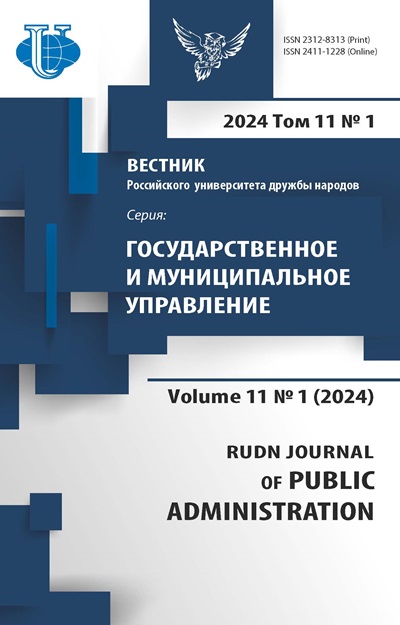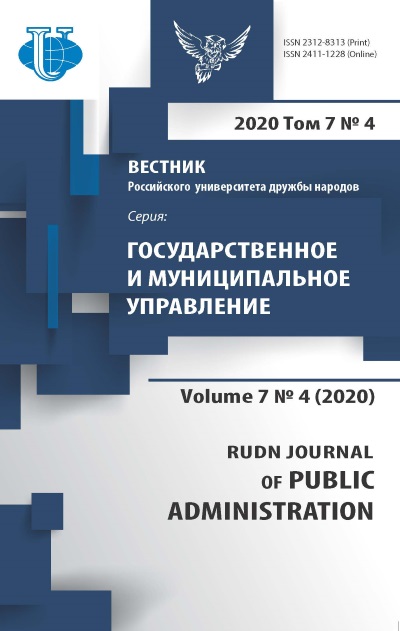Student-oriented Learning and “Living Values” of the University: Strategic Interaction
- Authors: Kulikovskaya G.A.1, Kulikovskaya N.A.1
-
Affiliations:
- RUDN University
- Issue: Vol 7, No 4 (2020)
- Pages: 387-399
- Section: ACADEMIC LIFE
- URL: https://journals.rudn.ru/public-administration/article/view/24986
- DOI: https://doi.org/10.22363/2312-8313-2020-7-4-387-399
Cite item
Full Text
Abstract
The purpose of the article is to consider possible ways to improve the effectiveness of student-oriented education in Russian universities through strategic interaction with the basic principles of their life. It is well known that the involvement of students in the management of higher education institutions (HEIs), their active participation in determining the individual trajectories of their professional training increases the motivation of students, and therefore the quality of education. To do this, it is necessary not only to fix the principles of student self-government in the local regulations of the University, but also to build mechanisms for implementing these principles. In particular, this can be expressed in the structure and content of educational programs developed in accordance with educational standards, consisting of a mandatory part and a part formed by participants in educational relations. Project-based learning will help bridge the gap between theory and practice in teaching students. Inclusive education should be provided not only with infrastructure, but also with special training of teachers and the inclusion of specialized adaptation modules in educational programs. To ensure quality control of students ' knowledge, the professional level of teachers and the organization of the educational process, intra-University quality management systems for training specialists are being created.an important element of this system should also be the structure of student self-government. It is also necessary to understand that student-oriented learning is not limited to the educational process, but covers the organization of campus life, the possibility of self-realization of students in various public organizations, in creative teams, i.e. it is inextricably linked to the entire system of principles, goals, priorities - the “Living Values” of the University. In the context of improving the competitiveness of education in Russian universities, the article identifies and justifies ways to improve the effectiveness of student-oriented learning. In particular, there was a high demand for the possibility of students’ influence on their individual learning paths, self-realization through participation in projects, both in the educational process and in public life. The research uses the results of sociological research based on surveys of students and teachers, including online surveys, as well as the practice of organizing the educational process and extracurricular activities in Russian universities. The results obtained can be used to further improve the development strategies of higher education institutions, including to increase their attractiveness for foreign students.
About the authors
Galina A. Kulikovskaya
RUDN University
Author for correspondence.
Email: kulikovskaya-ga@rudn.ru
ORCID iD: 0000-0003-2351-1711
Senior Lecturer of the Department of State and Municipal Management
Miklukho-Maklaya str., 6, Moscow, Russian Federation, 117198Nina A. Kulikovskaya
RUDN University
Email: kulikovskaya-na@rudn.ru
ORCID iD: 0000-0003-4382-0677
Head of the Student Personal Records Department
Miklukho-Maklaya str., 6, Moscow, Russian Federation, 117198References
- Becker G.S. Chelovecheskoe povedenie: jekonomicheskij podhod. Izbrannye trudy po jekonomicheskoj teorii [Selected Works on Economic Theory. Human Behavior: Economic Approach]. Moscow: SU HSE; 2003: 591–596 (In Russ.).
- Pocket World in Figures. 2017 Edition. The Economist by Profile Books; 2016: 199.
- Pocket World in Figures. 2019 Edition. The Economist by Profile Books; 2018: 61.
- Government of the Russian Federation. URL: http://government.ru/info/35566/. Accessed: 01.06.2020 (In Russ.).
- Osvoenie sredstv bjudzheta na nacproekty za 2019 god sostavilo 91,45% [The Use of Budget Funds for National Projects in 2019 Amounted to 91.45%]. TASS. 14.02.2020. URL: https://tass.ru/nacionalnye-proekty/7762311. Accessed: 01.06.2020 (In Russ.).
- Strategicheckiy globalnyi prognoz 2030 [Strategic Global Forecast 2030]. Ed. by Dynkin A.A. Moscow: IMEMO RAN; 2011: 213–218 (In Russ.).
- Peoples’ Friendship University of Russia (RUDN University). URL: http://www.rudn.ru. Accessed: 01.06.2020 (In Russ.).
- Kashirskaya I.K. Uchebnaya motivatsiya i motivatsiya dostizheniya u studentov s raznoi akademicheskoi uspevaemostju [Educational Motivation and Achievement Motivation among Students with Different Academic Performance]. RC04 ISA, Culture and Education: Social Transformations and Multicultural Communication. Moscow: RUDN University; 2019: 205–211 (In Russ.).
- Special Report “Life Education: Learning and Earning”. The Economist. 14.01.2017. URL: economist.com/specialreports. Accessed: 01.06.2020.
- Results of the survey on the quality of distance learning – 2nd section 16.04.2020 UMK. Peoples’ Friendship University of Russia (RUDN University). URL: https://pfur.sharepoint.com/:x:/r/sites/msteams_85f3b2/layouts/15/Doc.aspx?sourcedoc= %7BD284BC35-4508-4BCF-A68D-9F67D9FB40AA%7D&file=Результаты%20опроса %20по%20качеству%20дистанционного%20обучения%20—%202-й%20срез%20% 2016.04.2020%20УМК.xlsx&action=default&mobileredirect=true&DefaultItemOpen=1. Accessed: 01.06.2020 (In Russ.).
- Pocket World in Figures. 2018 Edition. The Economist by Profile Books; 2017: 61.
- The quality management system of the University. Peoples’ Friendship University of Russia (RUDN University). URL: http://quality.rudn.ru/. Accessed: 01.06.2020 (In Russ.).
- Puzanova Zh.V., Larina T.I. Sotsialnoe izmerenie studencheskich problem v konteste razvitiy infrastruktury sovremennogo universiteta [Social Dimension of Students’ Problems under the Development of the Contemporary University infrastructure]. RUDN Journal of Sociology. 2019; 19 (4), 800–813 (In Russ.).
- The great Charter of universities Magna Charta Universitatum. Peoples’ Friendship University of Russia (RUDN University). URL: http://www.rudn.ru/about/traditions/magna-charta. Accessed: 01.06.2020 (In Russ.).
- Vospitanie molodezhi: problema formirovaniy tsennostei v usloviych informatsionngo obshtestva: monografiy [Education of Youth: The Problem of Forming Values in the Information Society]. Ed. by V.A. Tsvyk Moscow: RUDN; 2020: 5 (In Russ.).
- Semenova I.V. Upravlenie tsennostno-motivatsionnoi sferoi gosudarstvennych sluzhashtich: diagnostika i model kompetentsyi [Public Servants’ Value-motivational Sphere Management: Diagnostics and Competency Model]. Specialty – 22.00.08 – sociology of management. Abstract of the PhD thesis. Moscow; 2019: 13 (In Russ.).
- Kulikovskaya G., Kulikovskaya N. Ways to Improve the Efficiency of Student-centered Learning in Russian Universities. 6th SWS International Scientific Conference on Social Sciences 2019, Bulgaria, Albena. 2019; 6 (4): 699–707.
- “Living Values” Project. Peoples’ Friendship University of Russia (RUDN University). URL: http://www.rudn.ru/about/traditions/magna-charta/living-values. Accessed: 01.06.2020 (In Russ.).
















